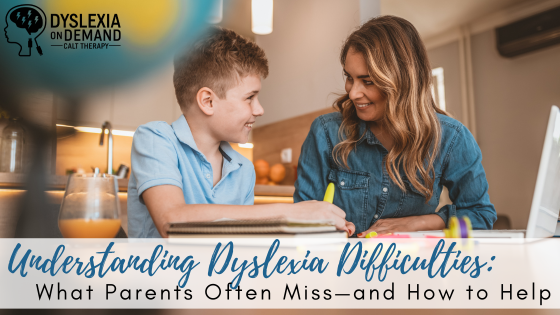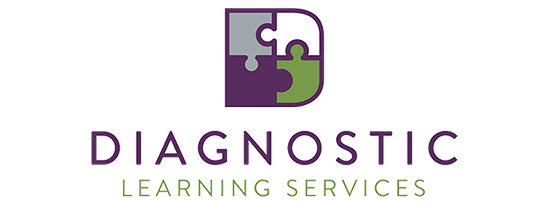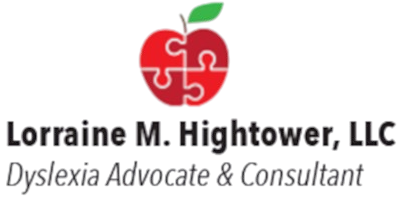
Understanding Dyslexia Difficulties: What Parents Often Miss—and How to Help
Executive Summary:
A dyslexia diagnosis can open the door to understanding how your child learns and how to best support them. By recognizing the challenges dyslexic students face—and addressing them with structured, multisensory therapy—parents can help their children build both confidence and reading success.
When your student has a dyslexia diagnosis, it can be life changing—and in a good way. Knowing more about this specific learning disability can empower both students and parents as they seek solutions for success in the classroom and beyond. Two of the most important things to learn as the parent of a dyslexic student: 1.) Dyslexia is neurobiological in origin, and 2.) It has nothing to do with a child’s lack of intelligence or a lack of effort. The brains of people with dyslexia work in a different, special way; the good news is that there is help in the form of intensive, multisensory intervention, like the dyslexia therapy offered at Dyslexia on Demand. However, as you support your child in their journey with dyslexia, it is important to understand some of the difficulties that come with this learning disability. Read on to learn a bit about what parents often miss when it comes to dyslexia, and how to help.
- Laziness is not the issue. Students with dyslexia have brains that work quite differently than neurotypical students. In fact, what often happens in the dyslexic brain is an overcompensation for the lack of activation that’s happening in certain parts of the brain during the reading process. When dyslexic readers are compensating, they’re performing a neurological detour in order to read. They’re not relying on phonemes or phonetic awareness; they’re often relying on memory. That said, what sometimes presents as lazy or lackadaisical in a dyslexic student is often a result of frustration and exhaustion from all of the work their brain has been doing just to read. The solution: Set your child up for success with dyslexia therapy. The Certified Academic Language Therapists (CALTs) at Dyslexia on Demand can work one-on-one with your student to help learn more efficient and effective ways to read.
- Reading is not automatic. One thing we know at Dyslexia on Demand: the brain learns to read the same way that it learns to talk—one sound at a time. Your dyslexic student may do well in other subjects; he or she may even be a skilled speaker or listener, but the fluency and comprehension needed for reading just aren’t up to par. Doing the same sounding-out exercises or trying to memorize words does not work well in the long run for students with dyslexia. The solution: At Dyslexia on Demand, we meet students where they are in terms of reading and comprehension levels. In our dyslexia therapy programs, we focus on the fact that it is so important to break the reading process down into the smallest parts before moving forward.
- Working memory is not working well. Dyslexia often affects a student’s working memory. This is a process that allows a student the ability to hold and manipulate information in the brain for a short period. That said, things in the classroom or even at home like multi-step instructions, details of something they just read, or multiple-step word problems can create difficulty for dyslexic students. Sometimes parents miss this detail, and they mistake working memory challenges for inattentiveness or forgetfulness. The solution: Both in school and at home, help your student to break down tasks into smaller, more manageable steps. During reading, allow for breaks so that your student can process the material that was read. Incorporate diagrams or other manipulatives to help illustrate math concepts. At Dyslexia on Demand, our tailored dyslexia curriculum works to rewire the way a student’s brain works, providing the best possible outcomes for your child.
- Difficulties with dyslexia are not just academic in nature. For students with dyslexia, there is an almost-constant struggle with everyday academic tasks that might seem easy for their peers. This can take a heavy toll on the emotions of a dyslexic student, leading to feelings of frustration, embarrassment, or inadequacy. This can emerge as moodiness at home or a negative attitude towards anything related to school. It is so important to be aware of the emotional impact of dyslexia. The solution: Focus on your student’s strengths and successes—inside and outside of the classroom. Work to create a supportive and encouraging environment for your child; enlisting the help of the experts at Dyslexia on Demand can be life changing. Our mission includes changing the lives and self-concepts of children who struggle with dyslexia.
As the parent of a student with dyslexia, being aware of the challenges your student may face can be so helpful, as it can start you on the path to implement supportive strategies. Dyslexia therapy is one of the most effective interventions for students with dyslexia. Your patience, understanding, and awareness as a parent can only boost the benefits that therapy from Dyslexia on Demand can provide. Learn more about our programs on our website, or reach out to book a free consultation.
FAQs
1. Why does my child with dyslexia seem “lazy” or unmotivated?
What may look like laziness is often mental fatigue. Dyslexic students work much harder to read and process information, which can lead to frustration and exhaustion rather than a lack of effort.
2. How does dyslexia affect working memory?
Many students with dyslexia struggle to hold and manipulate information in short-term memory. Breaking tasks into smaller steps and using visuals or hands-on supports can make learning more manageable.
3. How can Dyslexia on Demand help my child succeed?
Dyslexia on Demand provides one-on-one, virtual dyslexia therapy led by Certified Academic Language Therapists (CALTs). Using structured, multisensory methods, therapy helps retrain the brain for more efficient reading while boosting confidence and emotional resilience.
References:
International Dyslexia Association. (2020). Compensatory skills and dyslexia: What does the science say? International Dyslexia Association. https://dyslexiaida.org/compensatory-skills-and-dyslexia-what-does-the-science-say/
Kearns, D. M., Hoeft, F., Hancock, R., Pugh, K. R., & Frost, S. J. (2019). The neurobiology of dyslexia. Haskins Laboratories. https://haskinslabs.org/sites/default/files/files/Kearns%2C%20Hoeft%2C%20Hancock%2C%20Pugh%2C%20Frost%20%282019%29%20Neurobiology%20of%20dyslexia.pdf
Munzer, T. G., Sharma, P., & Puranik, C. S. (2020). Dyslexia: Neurobiology, clinical features, evaluation and management. World Journal of Clinical Pediatrics, 9(2), 12–23. https://pmc.ncbi.nlm.nih.gov/articles/PMC7082242/
Reading Rockets. (2010). Dyslexia and the brain: What does current research tell us? Reading Rockets. https://www.readingrockets.org/topics/dyslexia/articles/dyslexia-and-brain-what-does-current-research-tell-us
Smith-Spark, J. H., Henry, L. A., Messer, D. J., & Ziecik, A. P. (2016). Working memory profiles of children with dyslexia. Frontiers in Psychology, 7, 1390. https://pmc.ncbi.nlm.nih.gov/articles/PMC6808376/
Varvara, P., Varuzza, C., Sorrentino, A. C., Vicari, S., & Menghini, D. (2014). Executive functions in developmental dyslexia. Frontiers in Human Neuroscience, 8, 120. https://pmc.ncbi.nlm.nih.gov/articles/PMC3945518/
Warmington, M., Hitch, G. J., Gathercole, S. E., & Holmes, J. (2023). Lived experiences of everyday memory in adults with dyslexia. Frontiers in Psychology, 14, 1211831. https://pmc.ncbi.nlm.nih.gov/articles/PMC10604285/
Smith-Spark, J. H., & Fisk, J. E. (2007). Executive functions in adults with dyslexia. Dyslexia, 13(1), 1–23. https://openaccess.city.ac.uk/id/eprint/13712/3/Executive%20functions%20in%20adults%20with%20dyslexia.pdf












